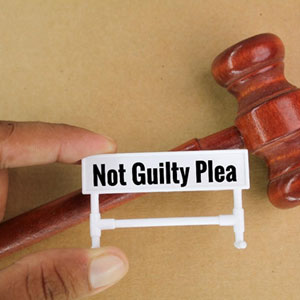What to Expect After Pleading Not Guilty in a DWI Case

In this article, you can discover:
- The plea-bargaining process and restrictions for DWI cases in New Jersey.
- The differences between motions to suppress and motions to exclude evidence in DWI cases.
- When and under what circumstances a prosecutor might offer a plea deal in a DWI case.
What Happens After I Enter a Plea of Not Guilty in My New Jersey DWI Case?
In New Jersey, plea bargaining DWI cases is quite restricted due to the state’s laws. Authorized plea bargains differ for first, second, and third offenders. For first-time offenders, the only authorized plea agreement allows the prosecutor to dismiss any additional charges associated with the DWI if the person pleads guilty. In cases involving a DWI and a breath test refusal charge, the prosecutor cannot dismiss the refusal charge. The only options are either to accept the plea of both the DWI and refusal with a recommendation that the penalties run concurrently and drop the other associated charges or go to trial.
For second or subsequent offenders, the only authorized plea bargain is to plead guilty to DWI and drop the associated charges. Prosecutors are also permitted to drop a refusal charge for a second or subsequent offender.
Despite these restrictions, plea bargaining guidelines allow a prosecutor to make an independent assessment of the strength of the state’s case. If the prosecutor believes he or she cannot get a conviction for DWI based on the evidence, they may move to dismiss the DWI despite the general prohibition on plea bargaining.
It is important to note that engaging in illegal plea bargaining is considered an ethics offense by the attorneys participating in the process. The consequences for a prosecutor or defense attorney involved in illegal plea bargaining can include suspension of their license to practice law. Therefore, attorneys must be cautious when engaging in plea bargaining, which can only be done in limited circumstances.

John Menzel, J.D.: Dedicated DWI Defense in New Jersey. With over 30 years of experience, committed to protecting your license, your freedom, and your reputation. Let's work together to beat that charge.
Request a Consultation Session (732) 218-9090
What Is a Motion to Suppress Evidence in a DWI Case?
A motion to suppress evidence in a DWI case concerns constitutional issues under the Fourth Amendment of the United States Constitution and Article One, Paragraph Seven, of the state constitution. These provisions protect individuals from unreasonable searches and seizures and require a warrant for most searches and seizures. However, the vast majority of DWI cases involve warrantless stops and arrests, which are presumed invalid under the law. This presumption favors the defendants in such cases.
Motions to suppress are preliminary questions, and the key factor is reasonableness. The state has the burden of establishing the reasonableness of the stop, the reasonableness of having someone get out of their car, and probable cause to believe that person may have been operating a motor vehicle while under the influence to justify the arrest. Despite the presumption of invalidity, it is relatively easy for the state to overcome these burdens, as the questions are not about guilt or innocence but rather the reasonableness of the officer’s actions. Judges give police officer much leeway on these questions because society wants to encourage police officers to uphold the law.
It is crucial to distinguish between motions to suppress and motions to exclude evidence, as they involve different legal questions and burdens of proof. Motions to suppress involve constitutional questions of reasonableness, while motions to exclude typically involve foundational questions about whether there’s enough evidence to justify the admission of evidence.
At What Point Will the Prosecutor Make a Plea Offer?
A prosecutor may offer a plea bargain after reviewing the evidence and determining whether there is a defect in the foundation. Most municipal prosecutors in New Jersey are part-time prosecutors and may not have a significant financial incentive to conduct trials. Thus, if a defendant can present a valid claim that a foundational defect exists, the prosecutor may be willing to concede the defect just to avoid a trial. In such cases, the defendant may plead guilty to a lesser charge, like reckless driving, which is much less severe compared to a DWI charge.
However, supporting the decision to offer a plea deal with facts in the record is essential. This involves consulting with the police officer, who is the state’s witness, and having them make a statement confirming the existence of the defect. This process ensures that all parties involved are protected from allegations of illegal plea bargaining and streamlines the legal process.
Keep in mind that if defense attorneys tried every case instead of seeking plea bargains or alternative resolutions to trials, the legal system would likely become overwhelmed. Currently, only about 1% of all DWI cases go to trial. That percentage should be higher for an attorney concentrating his or her practice in DWI defense—say, 20-25%. The key is to strike a balance between defending the rights of the accused and maintaining the efficiency of the legal system.
In conclusion, plea deals in DWI cases in New Jersey are generally restricted, and attorneys must proceed with caution when engaging in plea bargaining. A prosecutor may offer a plea deal after reviewing the evidence and determining if the foundation has a defect. If a defendant can present a valid claim that a foundational defect exists, the prosecutor may be willing to concede the defect just to avoid a trial. However, the decision to offer a plea deal must be supported by facts in the record and involve consultation with the police officer involved in the case. Ultimately, the decision to accept a plea offer or to go to trial belongs to the client’s—not the defense attorney, not the prosecutor, and not the judge.
For more information on Pleading Not Guilty In A New Jersey DWI Case, an initial consultation is your next best step. Get the information and legal answers you are seeking by calling (732) 218-9090 today.

John Menzel, J.D.: Dedicated DWI Defense in New Jersey. With over 30 years of experience, committed to protecting your license, your freedom, and your reputation. Let's work together to beat that charge.
Request a Consultation Session (732) 218-9090
